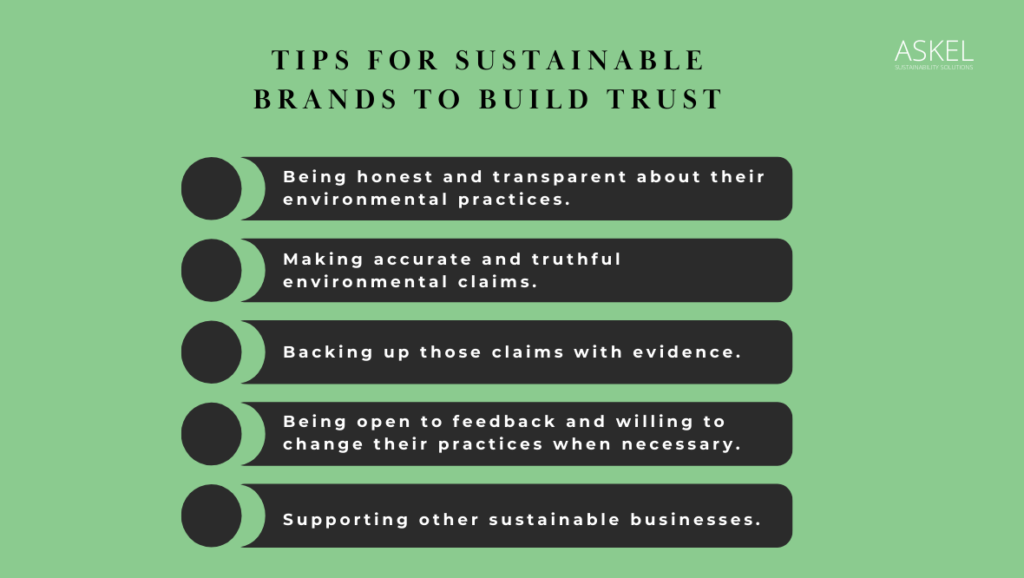9 Negative Effects Greenwashing Has on Your Business

Explore nine adverse consequences of greenwashing, shedding light on its detrimental impact on businesses, credibility, and environmental responsibility.
Greenwashing is the practice of making misleading or unsubstantiated claims about an organization’s environmental performance. It is a serious problem that harms businesses, consumers, and the environment.
There are several reasons why businesses greenwash. Some businesses may do it intentionally to mislead consumers and boost sales. Others may do it unintentionally because they do not fully understand the requirements for making environmental claims. Regardless of the reason, greenwashing can have many negative consequences for businesses.
In addition to the negative impacts on businesses, greenwashing also harms society at large. It can mislead consumers about the true environmental impact of products and services. This can lead to consumers making choices that are harmful to the environment.
Greenwashing can also make it difficult for consumers to identify and support businesses that are truly committed to sustainability. This can hinder the transition to a more sustainable economy.
In this article, we will explore the nine negative effects of greenwashing on businesses in more detail. We will also provide tips on how to avoid greenwashing and build a reputation as a sustainable business.
Want to know more about what Greenwashing is, why Companies do it, and Ways to Avoid it? Click to check out our in-depth article on the topic.
- 1. Undermining Brand Image
- 2. Adverse Environmental Impacts
- 3. Losing Consumer Trust
- 4. Investigation Resulting from Misleading Marketing Claims
- 5. Risk of Being Sued
- 6. Losing B2B Partners
- 7. Financial Losses as a Result of Greenwashing
- 8. Greenhushing
- 9. Greenwashing has a Negative Effect on Innovation and Healthy Competition
- Conclusion
- Related Posts
1. Undermining Brand Image
Consumers today are more aware of greenwashing than ever before. They are also more likely to choose products and services from companies that they perceive to be honest and transparent about their environmental practices.
When a company is outed as greenwashing, it can have a devastating impact on its brand image. Consumers may feel cheated and misled, and they may be less likely to trust the company in the future. This can lead to a decline in sales and customer loyalty.
The consumer who felt lied to by the company is likely to share her negative experience with others. This could be through online reviews, social media, or word-of-mouth. Other consumers who hear about the company’s greenwashing may also be less likely to trust the company or buy its products.
The negative impact of greenwashing on brand image is not limited to the immediate aftermath of being caught. Even if a company apologizes and makes changes to its marketing practices, it can take time to rebuild trust with consumers.
In some cases, the damage to a company’s brand image can be irreparable. For example, in 2015, Volkswagen was caught cheating on emissions tests for its diesel vehicles. The scandal caused widespread outrage and led to a sharp decline in sales. Volkswagen is still recovering from the damage to its brand image today.

2. Adverse Environmental Impacts
Greenwashing can also have several adverse environmental impacts. When consumers are misled about the environmental impact of products and services, they are more likely to make choices that are harmful to the environment.
For example, a consumer who believes that a product is made from recycled materials may be more likely to buy it, even if it is not the most environmentally friendly option available. Or, a consumer who believes that a company is committed to sustainability may be more likely to support that company, even if it is a major polluter.
Greenwashing can also lead to the development of products and services that are not as environmentally friendly as they claim to be. For example, a company that greenwashes its products may use less sustainable materials or manufacturing processes to save money. This can lead to increased pollution and resource depletion.
Examples of adverse environmental impacts of greenwashing:
- Increased pollution: Greenwashing can lead to an increase in pollution from manufacturing processes, transportation, and product disposal.
- Resource depletion: Greenwashing can lead to the depletion of natural resources, such as water, minerals, and forests.
- Biodiversity loss: Greenwashing can contribute to biodiversity loss by harming habitats and ecosystems.
- Climate change: Greenwashing can contribute to climate change by increasing greenhouse gas emissions.
3. Losing Consumer Trust
Greenwashing can have a devastating impact on consumer trust. When consumers discover that a company has been greenwashing, they are likely to feel betrayed and misled. This can lead to a loss of trust in the company, its products, and its services.
The loss of consumer trust can have many negative consequences for businesses. These include:
- Decline in sales: Consumers are less likely to buy products and services from companies that they do not trust.
- Increase in customer churn: Customers who lose trust in a company are more likely to switch to a competitor.
- Damage to reputation: A negative reputation can make attracting new customers and partners more difficult.
- Regulatory scrutiny: Companies that are caught greenwashing may face regulatory scrutiny and fines.
The loss of consumer trust can also harm the sustainability movement as a whole. When consumers lose trust in sustainable brands, they are less likely to support them. This can make it more difficult for sustainable businesses to succeed and can slow the transition to a more sustainable economy.

Greenwashing and generic loss of consumer trust
A 2023 study found that the loss of consumer trust caused by greenwashing is not limited to the brand caught greenwashing. It also impacts other brands engaging in similar businesses. This is because consumers may become more skeptical of all brands in the industry, regardless of whether or not they have been caught greenwashing.
This is known as a generic loss of consumer trust. It is a serious challenge for sustainable brands. To differentiate themselves from their greenwashing competitors, sustainable brands need to put in even more effort in their communications when it comes to accuracy, precision, and positive environmental initiatives.
4. Investigation Resulting from Misleading Marketing Claims
Suppose an environmental claim made by your company seems noticeably misleading, and the public starts questioning it. In that case, it’s possible that someone might report your advertisement or communications to the local consumer protection authority. Meanwhile, it is also possible for the local consumer protection authority to open its own independent investigation on such marketing claims.
In such cases even if the authorities investigate the claims and find that the brand has everything in order when it comes to the precision and accuracy of the claims, therefore giving them a clean bill of performance, the time during which the investigation is open can cause much-added stress to the organization under inquiry.
A person, whether natural or legal is not guilty of wrongdoing before an official ruling has been given. However, in practice, a company that wishes to keep up its image as a reliable partner does not wish to have a public investigation opened into its marketing or other communications. While routine checks and mapping of the state of the industry is a chance to show up as an industry leader in sustainability and transparency, having an official investigation opened on a company’s marketing claims is rarely a good thing.

5. Risk of Being Sued
In the worst-case scenario, misleading environmental claims can end up getting your company sued for the damages caused by them.
Litigation is expensive, time-consuming, and resource-intensive. The process is often public enough to generate adverse media coverage. Some companies succeed in handling these types of matters through closed-door arbitration, but this is not always an option.
Even if your company is acquitted, being sued in the first place communicates that it is willing to take legal risks. This can damage your reputation and make it more difficult to attract and retain customers and partners.
Here are some examples of companies that have been sued for greenwashing:
- Volkswagen: Volkswagen was sued in the United States and Europe for cheating on emissions tests for its diesel vehicles. The company was ordered to pay billions of dollars in fines and settlements.
- Tesla: Tesla was sued in the United States for misleading consumers about the range and capabilities of its electric vehicles. The company was ordered to pay millions of dollars in damages.
- Nestle: Nestle was sued in the United States for misleading consumers about the sustainability of its KitKat chocolate bars. The company was ordered to pay millions of dollars in damages.
These are just a few examples of the many companies that have been sued for greenwashing. As consumers become more aware of greenwashing, we will likely see even more lawsuits in the future.
Want to know more about the Greenwashing and the Legal Landscape? Click to check out our in-depth article on the topic.
6. Losing B2B Partners
Before signing significant partnership contracts, before investing in a company, before receiving a quote for insurance or business financing, companies, investors, insurance companies and banks will conduct their own due diligence into the history of your company.
If it looks like a company comes with a reputational risk because of a lot of adverse media associated with it, or it is facing legal risks due to loosely formatted and liberally used marketing claims, oftentimes it will result in increased costs of financing and business insurances, deterring investors and limiting the number of companies willing to work with the company due to the risk of being associated with making misleading claims themselves.
When it comes to making hard business decisions, banks, insurers, investors, and other companies your company could partner with, cannot afford to differentiate whether the greenwashing that happened in your company happened due to a lack of understanding of the gravity of the matter, or due to ill intentions. Both of those options are risky from the point of view of a potential partner.

7. Financial Losses as a Result of Greenwashing
Loss of marketing and advertising costs
If you need to pull a marketing campaign or advertisement due to greenwashing, you will lose the money you spent on the creation of the campaign or advertisement. This can be a significant financial loss, especially if the campaign is expensive to produce.
Legal costs
If you are sued for greenwashing, you will incur legal costs. These costs can be high, especially if the case goes to trial. In addition to legal fees, you may also be required to pay court costs and other expenses.
Penalties and damages
If you are found guilty of greenwashing, you may be ordered to pay penalties or damages. The amount of the penalty or damages will depend on the severity of the offense.
Loss of revenue
If consumers start boycotting a product or brand due to greenwashing, the result will be a loss of revenue. This can be a significant financial loss, especially if the boycott is widespread.
Other financial losses
In addition to the direct financial losses listed above, greenwashing can also lead to other financial losses, such as:
- Increased difficulty attracting investors and partners
- Higher cost of insurance
- Decreased employee morale
- Damage to the company’s brand reputation
8. Greenhushing
Greenhushing is the phenomenon of companies that have legitimate positive-impact green initiatives being hesitant to speak up about them because they are worried that their actions will be labeled as greenwashing. This is due to the risks associated with greenwashing, such as legal action, financial losses, and damage to reputation.
Greenhushing is extremely problematic because it silences companies that are actively making an effort to be sustainable in their operations. This can prevent consumers from learning about and supporting sustainable businesses. Additionally, it can make it more difficult for consumers to make informed choices about the products and services they consume.
There are many reasons why companies might be hesitant to talk about their sustainability initiatives. Some companies may be worried that consumers will not care about their sustainability efforts. Others may be worried that their sustainability efforts are not good enough. And others may be worried that they will be accused of greenwashing, even if their claims are accurate and truthful.
Despite the risks, companies must talk about their sustainability initiatives. By doing so, companies can help to raise awareness of sustainability issues and encourage other businesses to follow suit. Additionally, companies can use their sustainability initiatives to build trust with consumers and position themselves as leaders in sustainability.

9. Greenwashing has a Negative Effect on Innovation and Healthy Competition
Greenwashing can hurt innovation and healthy competition in several ways.
- First, resources spent on making something look environmentally friendly can be in turn used for innovating to achieve real and lasting results in terms of environmental impact. For example, a company that spends money on marketing itself as green, but does not invest in sustainable practices, is diverting resources away from developing more sustainable products and services.
- Second, greenwashing can create a race to the bottom, where companies feel pressured to make misleading environmental claims to stay competitive. This can discourage companies from making real investments in sustainability, as they may feel that they will not be rewarded for their efforts.
- Third, greenwashing can make it difficult for consumers to identify and support sustainable businesses. When consumers cannot trust companies’ environmental claims, they are less likely to support companies that are truly committed to sustainability.
However, there is a growing trend of companies making real efforts to improve their ESG impacts. This is a positive development, as it suggests that companies are recognizing the importance of sustainability and are willing to invest in making a positive impact.
Conclusion
Greenwashing is a serious problem with real-world consequences for businesses and consumers alike. Businesses that greenwash can face several negative impacts, including:
- Loss of customer trust
- Financial losses
- Legal liability
- Damage to reputation
- Greenhushing
- Negative impact on innovation and healthy competition
Greenwashing can also have several negative consequences for society, including:
- Misleading consumers about the environmental impact of products and services
- Hinders progress towards sustainability
- Creates a sense of complacency
- Distract consumers from supporting eco-friendly alternatives
It is important for businesses to be aware of the risks of greenwashing and to take steps to avoid it.
Greenwashing is a complex issue, and there is no easy solution. However, by raising awareness of the problem and by encouraging businesses to adopt sustainable practices, we can help to create a more sustainable future for all.

Additional thoughts
The increasing prevalence of greenwashing suggests that it is no longer just an unpleasant side effect of competition, but a very real issue with real-world consequences. Businesses need to take greenwashing seriously and take steps to avoid it.
Consumers also have a role to play in the fight against greenwashing. By being critical of marketing claims and by supporting businesses that are truly committed to sustainability, consumers can help to create a more sustainable marketplace.
We all have a role to play in creating a more sustainable future. By working together, we can reduce greenwashing and promote sustainable business practices.


